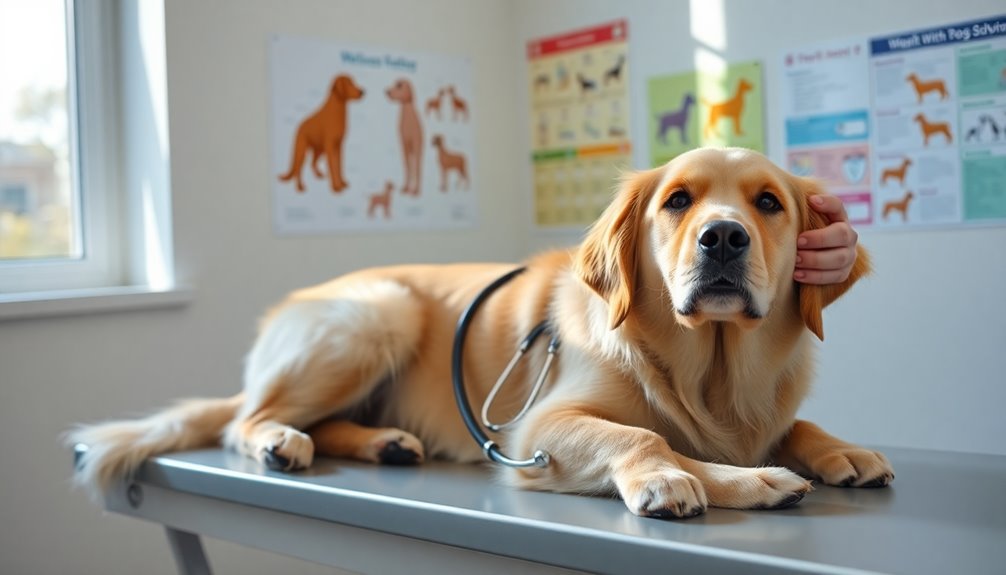To prevent health issues in your dog, it's crucial to adopt a proactive approach. Start with regular veterinary check-ups tailored to your dog's age and breed. Keep up with vaccinations to protect against dangerous diseases. Incorporate parasite prevention strategies like grooming and maintaining a clean environment to combat worms and fleas. Ensure your dog's diet is well-balanced, focusing on high-quality ingredients and proper portion sizes. Don't overlook dental care; regular brushing and check-ups can prevent painful problems. There's plenty more to explore on ensuring your dog stays healthy and happy.
Key Takeaways
- Schedule regular veterinary check-ups to monitor health, detect diseases early, and receive tailored care based on breed-specific risks.
- Ensure vaccinations are up-to-date to protect against serious diseases and contribute to community health by reducing disease spread.
- Maintain a balanced diet with high-quality ingredients and consult your vet to adapt feeding schedules based on age and health needs.
- Promote dental health through regular brushing, professional check-ups, and additional dental care methods to prevent chronic issues.
- Be aware of genetic predispositions in your dog's breed and address environmental factors to minimize potential health risks.
Regular Veterinary Exams

Regular veterinary exams are crucial for maintaining your dog's health and catching potential issues early. For adult dogs in good health, annual exams are recommended, while those with past illnesses or higher disease risks should visit semi-annually. Senior dogs and giant breeds benefit from twice-yearly check-ups, and puppies need monthly exams for their first four to six months. If your dog has medical problems, more frequent visits may be necessary.
During these exams, your vet conducts a comprehensive physical assessment, evaluating dental health, body condition, and behavior. They'll check for signs of arthritis and assess your dog's skin and coat for flea and tick control. Early detection of diseases like cancers and parasites is vital; your vet can identify heart murmurs, enlarged lymph nodes, and other issues before they become serious. Furthermore, routine exams are essential for early disease detection, allowing for timely interventions that can improve your dog's health outcomes.
Additionally, annual screenings for heartworm and intestinal parasites, along with routine blood tests and urinalysis, help monitor your dog's overall health. By paying attention to any changes in your dog's behavior or home life, you can provide your vet with essential information that enhances their care.
Regular exams are an investment in your dog's long-term well-being.
Vaccination Importance

Ensuring your dog is up to date on vaccinations is vital for their health and safety. Vaccinations protect against deadly diseases like parvovirus, distemper, and rabies, which can lead to severe symptoms or even death. By stimulating your dog's immune system, vaccines help produce antibodies that fight off specific pathogens, significantly reducing the risk of contracting or spreading these illnesses.
Many boarding facilities and obedience classes require proof of vaccinations, so keeping your dog current is essential for social activities. Rabies vaccination is legally required by 3-6 months of age, with boosters every 1-3 years, and missing these can limit your dog's participation in various activities.
Remember, vaccinations aren't a one-time deal. Booster shots are necessary to maintain immunity, with different vaccines having specific intervals for follow-up. Starting the puppy vaccination series at 6-8 weeks and adhering to the recommended schedule is crucial for ongoing protection. Additionally, regular vaccinations can reduce long-term vet bills by preventing costly treatments for preventable diseases.
Vaccinated dogs also promote public health, reducing the spread of diseases like rabies within your community. This is especially important for households with young children, the elderly, or those with weakened immune systems.
Protecting your dog ultimately contributes to a healthier environment for everyone.
Parasite Prevention Strategies

Keeping your dog healthy goes beyond vaccinations; it also involves implementing effective parasite prevention strategies. Start by maintaining a clean living environment. Regularly wash your dog's bedding and toys, and vacuum carpets and furniture to eliminate fleas or ticks. It is important to remember that regular cleanliness can significantly reduce the risk of parasites entering your home.
Make it a habit to pick up and dispose of feces immediately to reduce the risk of worm eggs in your yard. Stick to clean parks and trails where you can minimize exposure to parasites.
Regular grooming is crucial too. Check your dog for signs of fleas, ticks, or skin irritations during grooming sessions. Inspect the ears and eyes for any signs of infection, and use a flea comb to catch any hidden pests.
Don't forget about preventative medications. Use topical treatments or oral medications to repel fleas and ticks, and ensure you administer heartworm prevention regularly. Consider flea collars for added protection.
Finally, incorporate regular deworming and fecal testing into your dog's health routine. By following these strategies, you can significantly reduce the risk of parasite-related health issues for your furry friend.
Dental Health Maintenance

Maintaining your dog's dental health is essential for their overall well-being, as poor oral hygiene can lead to serious health issues. The foundation of good oral health is regular tooth brushing. Aim to brush your dog's teeth once a day, but at least 2-3 times a week if daily brushing isn't feasible.
Always use toothbrushes and toothpaste specifically made for dogs, as human products can be harmful. Start brushing when your dog is a puppy to help them get used to the process; begin with your fingers near their mouth before transitioning to a toothbrush. Additionally, early detection of dental issues can help prevent chronic pain and discomfort.
Professional dental checkups and cleanings are crucial too. Schedule these visits every 12-24 months, as recommended by your vet. During checkups, the vet will perform a thorough oral exam, which may include x-rays.
Depending on your dog's breed and their home dental care, professional cleanings might require general anesthesia to remove tartar.
Incorporate additional dental care methods like dental powders, water additives, and approved chews to promote healthy teeth and gums. These methods, along with regular brushing and checkups, will help you keep your dog's smile bright and healthy.
Nutrition and Diet Guidelines

A well-balanced diet significantly impacts your dog's overall health, complementing their dental care routine. Essential nutrients like proteins, fats, carbohydrates, vitamins, and minerals are crucial for maintaining your dog's well-being. Dogs require 10 essential amino acids that must be provided through their diet to ensure proper health.
Aim for a diet that includes complete and balanced nutrition, as indicated by labels meeting the AAFCO standards. Meat should comprise at least 33% of their daily feed, while carbohydrates can come from dog-safe fruits, vegetables, and legumes.
Establish a feeding schedule that suits your dog's size and age. Adult dogs usually do well with one or two meals a day, while large breeds benefit from two meals to prevent bloating.
As a rule of thumb, feed them 2-3% of their body weight, adjusting as necessary based on activity levels.
When choosing dog food, consider commercial options like dry or canned food, or consult a veterinary nutritionist if you prefer homemade meals. Limit treats and table scraps to 10% of their daily caloric intake to avoid health issues.
Regularly consult your vet to adapt your dog's diet based on their age, health status, and any specific conditions they may have.
Behavioral and Genetic Insights

Understanding your dog's behavior often requires delving into both genetic factors and environmental influences. Genetic diseases can significantly impact how your dog acts and interacts with the world. Many conditions, like hip dysplasia or degenerative myelopathy, are hereditary, passed down from one or both parents. Certain breeds, such as German Shepherds and Labrador Retrievers, are more susceptible, which means being aware of these risks is crucial for responsible ownership. Additionally, the presence of mutations in DNA does not guarantee disease development, but it can provide insights into potential health issues. Knowing that certain breeds, like Rottweilers, are prone to specific health challenges can also inform your care approach.
Behavioral traits can also stem from inherited characteristics. For instance, breeds with a predisposition for anxiety or aggression may require tailored training and socialization strategies. Genetic screening plays a vital role here, as it identifies mutations that could lead to health issues or behavioral challenges.
Moreover, environmental factors like nutrition and exposure to toxins can exacerbate genetic predispositions. Ensuring your dog receives proper nutrition and avoiding inbreeding can help mitigate risks. For example, providing a balanced diet with high-quality ingredients can significantly improve overall health and well-being.
Regular veterinary check-ups can lead to early detection of genetic conditions, allowing you to implement effective management strategies. By understanding these insights, you can enhance your dog's quality of life and longevity.
Frequently Asked Questions
How Can I Tell if My Dog Is in Pain?
To tell if your dog's in pain, watch for physical signs like limping, stiffness, or unusual postures.
Notice any behavioral changes, such as restlessness or reluctance to play.
Keep an eye on daily habits—loss of appetite or altered sleeping patterns can indicate discomfort.
Listen for vocalizations like whining or growling when you touch them.
If you see these signs, it's important to consult your vet for a proper evaluation.
Are There Specific Breeds More Prone to Health Issues?
Yes, some dog breeds are definitely more prone to health issues.
For instance, German Shepherds often face hip dysplasia, while Bulldogs typically struggle with respiratory problems.
Labrador Retrievers may encounter joint issues, and Dachshunds can develop intervertebral disc disease.
If you've got a specific breed in mind, it's essential to be aware of their common health concerns so you can provide the best care and catch any potential issues early on.
What Are the Signs of Dental Disease in Dogs?
You should watch for several signs of dental disease in your dog.
If you notice bad breath, discolored teeth, or bleeding gums, it's time to take action.
Look for behavioral changes like difficulty picking up food or reduced appetite.
Excessive drooling and facial swelling can also indicate problems.
If you see loose teeth or notice blood on chew toys, your dog may be in pain and needs a vet's attention.
How Often Should I Change My Dog's Food?
You should change your dog's food every 2–4 months to provide nutritional variety and help prevent food allergies.
This rotation keeps your dog interested in their meals and can introduce beneficial bacteria to their gut.
Pay attention to your dog's response to new foods, adjusting as needed. If your dog experiences gastrointestinal upset, extend the transition period or consult your veterinarian for tailored advice on dietary changes.
Can Stress Affect My Dog's Health?
Yes, stress can definitely affect your dog's health.
When your pup experiences stress, it can lead to a weakened immune system and even increase the risk of serious conditions like cancer. You might notice changes in their behavior, like loss of appetite or trembling.
To help your dog, focus on reducing stress through regular exercise, cuddling, and maintaining a predictable routine.
This way, you can support their overall physical and psychological well-being.
Conclusion
By prioritizing regular veterinary exams, vaccinations, parasite prevention, dental care, and proper nutrition, you can significantly reduce the risk of health issues in your dog. Don't forget to consider their behavioral and genetic factors, as these play a crucial role in their overall well-being. Taking these proactive steps not only keeps your furry friend healthy but also strengthens your bond with them. Remember, a happy, healthy dog is a joy to have by your side!










